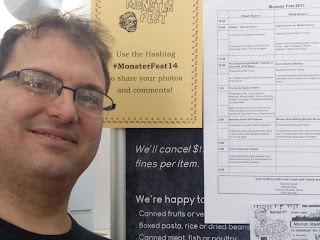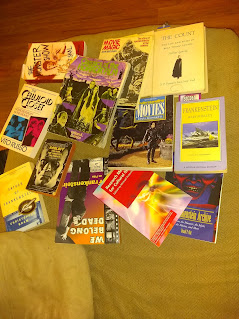I recently collected a bunch of my previously published short stories and poetry and bound them together in a self-published collection titled
Classic Camp's Classic Horror Emporium. It is available now on Amazon
here. After doing so, several people asked me how I published through Kindle Direct Publishing, and I kind of stammered through the answer. Not trying to be rude, but it was just one of those things that I figured out as I went along. So, I thought a blog post about how I self-published my first short story and poetry collection would be fitting since I have not blogged in a while.
First go to Amazon.com and sign in. Scroll to the bottom of the page and click on Kindle Digital Publishing. I actually Googled KDP and found this shortcut later, but it brought me to the same page. Click the big yellow button that reads + Create at the top. The next page asks what you would like to create, a Kindle e-book, paperback, hardcover, or a series. So far, I have only created a paperback and a Kindle e-book, but it appears the hardcover is pretty much the same as the paperback. I am not sure about how to create a series, yet.
So for the sake of this blog, I clicked paperback. It then asks you type in your book title and subtitle (the subtitle is optional). It is also optional to enter the edition number. You can then add up to nine other contributors, which is important if you ever want to create an anthology instead of a collection (an anthology being a collection of short stories and poetry from different authors and a collection being works from only one author).
Scrolling down the same page a little further, it then asks for a description of the book. For this, I used the forward from my collection. Next, you choose if you own this work or if it is a public domain work. I checked off that I own the work. After that, it asks if there are any sexually explicit images or language, and I checked off no for my work. Then it asks for the minimum and maximum ages for the work, and I chose 12 to 18+ because these works do not contain any real explicit language. They are pretty much PG-13.
Next, it asks for the primary marketplace, and I chose Amazon.com because all of the other choices are international markets. Choose your categories, such as "mystery, thriller, and suspense," or "fiction & literature" from a dropdown menu. This is so Amazon can categorize the work. There are also subcategories and placement to choose from. It asks for some keywords so your book can come up when related words are searched. I chose words like short stories, collection, nature poetry, gothic, etc. You can choose up to seven of them. Then choose if your publication date is the release date or if it was previously published, and finally choose if you want today to be your release date or if you want to schedule it for a future date. I chose the same day, but in the future, I may try to build some anticipation and choose a future date. Click save and continue.
Here you can let Amazon give you an ISBN number or enter your own if you have one. I just let Amazon give me one. Next, choose if your book is in black and white or color and if you want white or cream paper. Then choose the trim size. This is the size of paper your book will be and determines how you will need to format your file to upload. Choose bleed or no bleed depending on if the book has images. This is all laid out in the KDP instructions. Choose if the book cover should be matte or glossy. I like glossy book covers, personally.
Now you finally get to upload the manuscript, and this is where things grew a little hairy. I write everything in Microsoft Word, and through trial and error, I have learned that single space in Times New Roman works well for books, but you can choose whichever font you like. I do suggest single space, however, because it looks more professional. Then click the previewer to see how it lines up. Likely you will need to adjust the margins of the Word document until they align into the margins of the trim size you chose earlier. If you want page numbers, this can also be accomplished by clicking insert, and then going to page numbers and choosing the placement of those page numbers. To adjust margins in Word, go to view and check the box next to ruler, then click and drag the tiny box on the left to where it you want to margins. Click and drag the tiny triangle on the left because the pages have to be centered. Then click the part of the ruler on the left at the top of the page where the shaded portion meets the dark part of the ruler and drag it where you want the top and bottom margins. However, to get the page numbers into the trim margins on Kindle, double click in the top margin to open up the header and hit enter as many times as needed until the page numbers appear within the trim margin. I wound up readjusting my manuscript several times and reuploading it and previewing it over and over until I got everything to line up correctly. I believe there is a way for KDP to do this automatically, but I kind of liked doing this part manually so I know it was done right.
Next, choose the cover photo. Kindle has an option of uploading cover you have already created, or you can choose among the many covers they have created. I chose one of Kindle's previously made covers because I'm on a slow track of learning about this stuff on my own. You can also choose where the book title appears in various styles and fonts. I chose a different style for the title across the same cover image for my paperback and e-book versions, just to have some differentiation.
Amazon also asks you to indicate whether or not generative AI was used in the creation of the book. I obviously chose no.
Finally, choose the pricing for the book. I chose to have my book available in all territories. Pricing, royalties, and distribution gets a little confusing. My first self-published book, a short story titled, "House of Vergosi," which is also included in this new collection, I did not include in expanded distribution because it keeps the price down. This one I did choose expanded distribution because I believe it is available to more people in more areas around the world. I'm still not fully sure what the difference is, honestly, but I do know the book has to have a higher price if you choose expanded distribution. It will tell you what the whole sale price of the book will be and you can figure out how much you want to charge for it to earn a profit.
Finally, click publish your book. It is pretty much the same for the e-book version. Choose the price at the end again, and the break-even price is far lower for e-books. That's how I did it. Every author should try to self-publish at least once just to see what goes into the process. There are other platforms that will allow people to self-publish, but from what I've heard, Kindle is still the easiest and the best way to make any money. Speaking of which, getting the money earned from book sales is another process, which I may blog about at another time. I hope everyone found this process helpful.


































